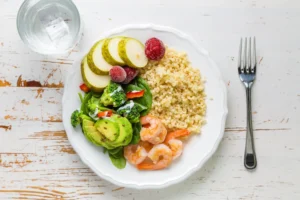In today’s fast-paced world, fast food seems like a convenient option for many busy individuals. Grabbing a quick burger or slice of pizza might save time, but it often comes at a cost—both to your health and wallet. Cooking at home, on the other hand, offers numerous benefits that far outweigh the convenience of fast food. Here are 10 compelling reasons why cooking at home beats fast food every time.
1. Better Nutritional Control
When you cook at home, you have full control over what goes into your meals. You can choose wholesome ingredients, control portion sizes, and limit unhealthy additives like excessive salt, sugar, or preservatives. Fast food, on the other hand, is notorious for being loaded with sodium, unhealthy fats, and added sugars to enhance flavor and shelf life. By preparing meals yourself, you can focus on balanced nutrition and incorporate a variety of vegetables, lean proteins, and whole grains.
The Hidden Calorie Problem
Fast food meals are often higher in calories than homemade meals, and people tend to underestimate how much they consume. For example, a fast food burger and fries can easily surpass 1,000 calories, while a homemade grilled chicken salad with a light dressing could be as low as 300-400 calories, while still being just as filling.
2. Cost-Effective in the Long Run
While fast food may seem like a cheap option, especially with dollar menus and meal deals, cooking at home is much more cost-effective in the long run. Purchasing ingredients in bulk and preparing meals at home saves money over time. Simple staples like rice, beans, pasta, and vegetables are affordable and can be used in a variety of dishes. Additionally, you can cook in larger batches and store leftovers for future meals, further reducing the cost per meal.
Budget-Friendly Meal Prep
With careful meal planning, you can stretch your grocery budget further by preparing versatile ingredients that work across multiple meals. For example, a whole roasted chicken can be used for sandwiches, soups, salads, and casseroles throughout the week, ensuring nothing goes to waste.
3. Healthier Ingredients and Fresher Food

When you cook at home, you can ensure the freshness of your ingredients, unlike fast food that may use pre-packaged, frozen, or heavily processed foods. Fresh ingredients like fruits, vegetables, and lean meats not only taste better but are packed with essential vitamins and nutrients. You also avoid artificial flavors, colors, and preservatives commonly found in fast food items.
Avoiding Processed Ingredients
Many fast food items rely on heavily processed ingredients to extend their shelf life or improve taste. Processed foods are often high in trans fats, refined sugars, and artificial chemicals that can harm your health over time. Cooking at home lets you prioritize fresh, minimally processed foods.
4. Customizable to Your Taste
One of the best parts of cooking at home is the ability to customize your meals to suit your preferences. Whether you’re following a specific diet, like vegetarian, keto, or gluten-free, or simply trying to reduce certain ingredients, home cooking gives you that flexibility. You can experiment with spices, herbs, and flavors that fast food chains just can’t offer.
Tailoring Meals to Dietary Needs
For individuals with food allergies, intolerances, or specific dietary needs, home cooking is a must. Fast food restaurants often cannot guarantee that their meals are free from allergens like gluten, dairy, or nuts. At home, you control every ingredient that goes into your meal, ensuring it aligns with your health goals.
5. Improved Cooking Skills
Cooking is a skill that improves with practice, and the more you cook at home, the better you become at it. Over time, you’ll gain confidence in the kitchen and learn new techniques that make meal preparation quicker and easier. With fast food, you’re not developing any skills; instead, you’re relying on others to prepare your food. As your cooking ability improves, you’ll find joy in creating delicious meals from scratch.
Gaining Confidence in the Kitchen
Once you’ve mastered a few recipes, you’ll feel more confident trying new dishes and experimenting with different cuisines. What starts as a necessity can grow into a rewarding hobby that benefits your health and well-being.
6. Portion Control and Avoiding Overeating

Fast food portions tend to be oversized, leading to overeating and excessive calorie intake. At home, you can control portion sizes to ensure you’re eating just the right amount for your needs. This is especially important for those trying to lose weight or maintain a healthy lifestyle. By cooking at home, you can create balanced meals with proper portions of protein, carbohydrates, and fats.
Avoiding Super-Sized Meals
Many fast food chains encourage customers to upgrade to larger portion sizes for a minimal cost increase. While it may seem like a good deal, it often results in consuming far more calories than intended. Cooking at home eliminates this temptation and allows you to eat in moderation.
7. Creating a Relaxing and Enjoyable Experience
Cooking at home can be a relaxing and therapeutic activity. It offers a break from the hustle and bustle of daily life, allowing you to unwind and focus on creating something nourishing for yourself or your family. Preparing a meal with loved ones or simply enjoying the process of cooking can be a rewarding experience, something that fast food can’t replicate.
Cooking as a Family Bonding Activity
Getting the family involved in the cooking process can be a fun and educational experience. Children can learn valuable life skills while helping in the kitchen, and it’s a great way to spend quality time together. Unlike the rushed nature of fast food, home-cooked meals foster connection and mindfulness.
8. Environmental Impact
Cooking at home is often better for the environment than ordering fast food. Fast food chains generate a significant amount of waste through disposable packaging, plastic utensils, and single-use containers. By cooking at home, you can minimize waste by using reusable containers, reducing food packaging, and composting food scraps.
Reducing Plastic Waste
When you cook at home, you have the opportunity to reduce your reliance on plastic and disposable materials. Opting for fresh produce in reusable bags, avoiding pre-packaged goods, and properly storing leftovers in glass containers are all eco-friendly practices that minimize your carbon footprint.
9. Building a Healthier Lifestyle
Cooking at home is a key component of building a healthier lifestyle. By consistently preparing meals at home, you’re more likely to make nutritious choices, stay on track with your health goals, and reduce the temptation to indulge in unhealthy fast food. Over time, home-cooked meals contribute to better long-term health outcomes, such as reduced risk of chronic diseases like obesity, diabetes, and heart disease.
Promoting Healthier Eating Habits
Home cooking encourages mindful eating habits, such as chewing slowly, savoring each bite, and appreciating the effort that goes into your meals. In contrast, fast food is often eaten quickly, leading to overeating and poor digestion.
10. Sense of Accomplishment
There’s a unique sense of satisfaction that comes from preparing your own meals. Completing a dish from scratch and enjoying the fruits of your labor can be incredibly fulfilling. Fast food offers instant gratification, but it doesn’t provide the same sense of accomplishment. Cooking at home allows you to take pride in your culinary creations and appreciate the effort that goes into nourishing your body.
Cooking as a Source of Personal Achievement
Whether it’s mastering a new recipe, trying a new cuisine, or simply making a meal that everyone enjoys, cooking offers a sense of achievement that extends beyond the kitchen. Each meal you prepare contributes to your confidence, creativity, and overall well-being.
Conclusion
While fast food may offer convenience, it pales in comparison to the numerous benefits of cooking at home. From better nutritional control to saving money, building healthier habits, and reducing environmental impact, home-cooked meals offer a wealth of advantages that fast food simply can’t match. By dedicating time to cooking at home, you’re investing in your health, well-being, and overall quality of life.



